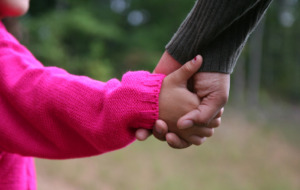 Marina* was just a few months away from the hearing that would determine whether she and her children would be granted asylum in the U.S. or be deported back to extreme violence in her home country. But she was too traumatized to plead her case in court. Her post-traumatic stress disorder (PTSD) symptoms caused her to shut down verbally, cry violently, shake, sweat, and faint – putting her chances of winning her asylum case, and remaining in the safety of America, in jeopardy.
Marina* was just a few months away from the hearing that would determine whether she and her children would be granted asylum in the U.S. or be deported back to extreme violence in her home country. But she was too traumatized to plead her case in court. Her post-traumatic stress disorder (PTSD) symptoms caused her to shut down verbally, cry violently, shake, sweat, and faint – putting her chances of winning her asylum case, and remaining in the safety of America, in jeopardy.
Marina’s story is all too common. For those who have fled violence, war, persecution, disaster, or other unthinkable situations, their often-dangerous journey to safety can leave lasting scars. And even after finding refuge in the U.S., the process of resettlement – adapting to a new land, new language, and new life – presents an entirely new set of challenges and uncertainties.
Global Refuge believes that addressing the mental well-being of refugees, immigrants, and asylum seekers plays a critical role in helping them achieve success. We designed our mental health programs with the goal of strengthening the overall wellness of recently arrived families and building stronger, healthier communities for all of us.
Supporting new beginnings
As they begin their new lives alongside us as coworkers, classmates, neighbors, and friends, immigrants and refugees face significant challenges and stressors that can greatly impact their mental wellness, including:
- Acculturation stress
- Fear of deportation and lack of knowledge about their rights and resources
- Family separation and reunification challenges
- PTSD from abuse, war, migration, and violence
- Depression and anxiety
- Grief and loss
For those who seek the help of professional mental healthcare to address these issues, systemic barriers to care often get in the way of their ability to find the support they need. Many New Americans do not have medical insurance, nor the money to pay for medical care out of pocket. They also have difficulty finding services in their own language. And as with many underserved communities, housing instability, food insecurity, and inadequate childcare also pose challenges to finding and receiving proper healthcare.
Help on the path to healing
Global Refuge is here to help our neighbors begin to heal and get the support they need to build a better life moving forward. Our licensed multilingual clinicians understand the refugee and immigrant experience and are well-versed in trauma-centered, culturally sensitive, and empowering care that supports individuals and families throughout their journey as a New American.
In Marina's case, her clinician helped address the most challenging symptoms that had prevented her from telling her story of violence and abuse. After four months of therapy, she was finally able to communicate her story and was granted asylum at her court hearing. Marina is now a proud U.S. resident and on her path to citizenship.
“[Marina] has such a better outlook on being able to manage her symptoms and is more optimistic that things are going to be better for her now,” says Ashley Woods, LCSW, Global Refuge Associate Director for Clinical Services.
In addition to addressing and managing PTSD symptoms like Marina’s, our free mental health services treat a range of mental and emotional needs, including anxiety and depression. Our case managers work with each client to create an individual service plan with concrete goals, along with an outline of the resources needed to meet those goals.
“I’m very proud that our program is able to offer these services for free and not add another stressor and barrier for clients,” Woods says.
Our holistic approach to mental and emotional wellness
While our one-on-one and group therapy programs provide safe spaces for our clients to express their emotions, process their experiences, and heal, we also work to help meet those needs that cannot be addressed through therapy alone.
Studies have shown that holistic and non-traditional mental health services can offer refugees and immigrants opportunities to reduce stress, connect with their minds and bodies, and alleviate symptoms of depression and anxiety.
“We’re exploring more holistic approaches and seeing how other activities can complement talk therapy and help clients meet their goals a little faster,” Woods says.
Global Refuge is working with community partners such as the Yoga Alliance and the University of Maryland, Baltimore School of Social Work to offer wellness activities like yoga, meditation, and even martial arts to add new elements to the holistic support we provide to New Americans.
Likewise, Global Refuge affiliate Canopy Northwest Arkansas has launched a soccer program that brings together case managers with current and former clients once a week to bond over their mutual love of the sport and foster a sense of camaraderie and belonging.
In Northern Virginia, our peer support group for Afghan refugees offers a connection to others living the same experience and provides a much-needed sense of community, all of which are essential to mental and emotional wellness.
“We’ve seen that offering such a diverse range of services goes a long way toward helping our new neighbors not only heal from their traumas, but also build social networks and strengthen ties in their new communities,” says Woods.
Our success in implementing these essential programs is further proof that investing in the mental health of New Americans builds brighter futures for us all.
Learn more about and support our Mental Health Services.

 Marina* was just a few months away from the hearing that would determine whether she and her children would be granted asylum in the U.S. or be deported back to extreme violence in her home country. But she was too traumatized to plead her case in court. Her post-traumatic stress disorder (PTSD) symptoms caused her to shut down verbally, cry violently, shake, sweat, and faint – putting her chances of winning her asylum case, and remaining in the safety of America, in jeopardy.
Marina* was just a few months away from the hearing that would determine whether she and her children would be granted asylum in the U.S. or be deported back to extreme violence in her home country. But she was too traumatized to plead her case in court. Her post-traumatic stress disorder (PTSD) symptoms caused her to shut down verbally, cry violently, shake, sweat, and faint – putting her chances of winning her asylum case, and remaining in the safety of America, in jeopardy.